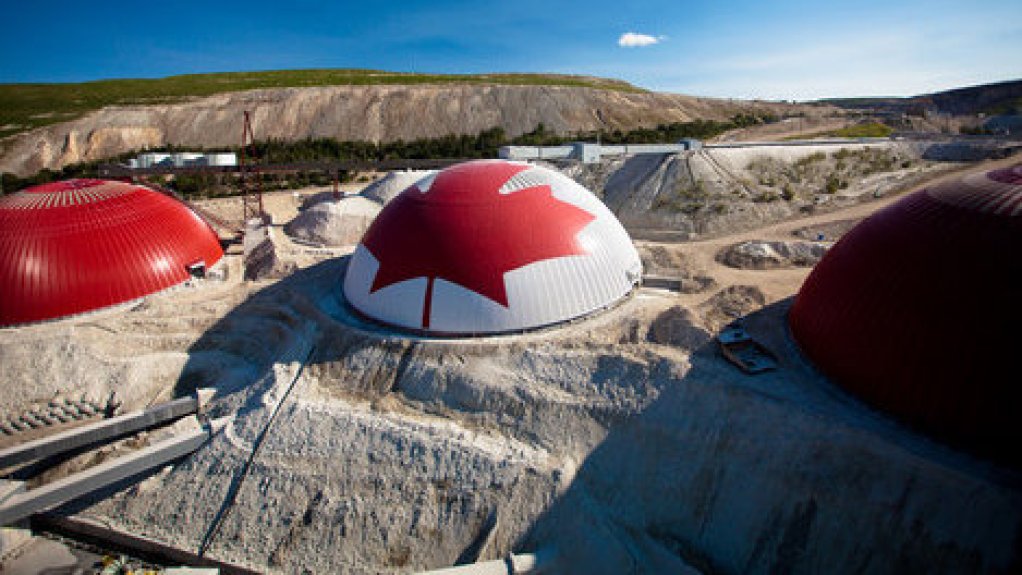Canada risks losing out on billions in critical mineral investments, report warns
Canada could miss out on up to C$12-billion a year in critical minerals production by 2040 unless governments take immediate steps to derisk investment and accelerate mining development, according to a new report from the Canadian Climate Institute.
Released on Wednesday, the report, titled 'Critical Path: Securing Canada’s place in the global critical minerals race', calls for policy shifts to enable Canada to meet surging demand for six key minerals: copper, nickel, lithium, graphite, cobalt, and rare earth elements.
Although Canada holds significant reserves, current production levels remain well below what is needed to satisfy domestic and international markets.
To unlock its critical minerals potential, Canada would need to attract C$30-billion in new investment over the next 15 years to meet domestic demand alone. That number rises to C$65-billion to align with projected global demand, which the report notes is expected to double by 2040.
“Critical minerals represent a multibillion-dollar opportunity for Canada in a global energy transition that continues to pick up pace. But Canada’s critical minerals sector is struggling to attract enough investment to keep up with demand,” said Canadian Climate Institute president Rick Smith.
“As competition heats up and trade relationships evolve, Canadian governments should make haste to adopt policies to unlock private investment and bring resources to market faster – all while forming respectful partnerships with Indigenous communities and reducing environmental risks.”
The report warns that the success of critical minerals projects will depend not only on market conditions, but on investor confidence, which is currently constrained by commodity price volatility and long permitting timelines.
The institute recommends that governments step in to reduce investment risk and accelerate investment. One way to do this is to share the financial risk of projects through agreements like equity investments, contracts for difference, or offtake agreements.
The report states that the most direct way for governments to share the financial risks of a mine is to take equity shares in the project. As equity holders, governments can provide the capital that private markets won’t, sharing both the downside risks and the upside potential of projects in the face of long payback periods.
Similarly, contracts-for-difference are contracts designed to protect investors from price volatility by establishing a negotiated settlement price. When market prices fall below the defined settlement price, a government pays the difference to the producer. When prices rise above it, the producer pays the surplus back to the government.
The contracts are meant to be temporary in nature, providing some price stability for investors while markets mature and become more predictable.
While urging faster project approvals, the report stresses that governments must avoid weakening environmental protections or undermining Indigenous rights. All new mining projects are expected to affect treaty lands, land claim areas, or territories closely tied to Indigenous communities. The institute argues that failure to build strong partnerships and uphold Indigenous self-determination would likely result in delays, community opposition, and legal setbacks.
“All clean growth projects will be built on treaty lands, land claim areas, traditional territories, or within close proximity to an Indigenous community. This unique moment in time can affirm Indigenous rights to land and self-determination and encourage meaningful partnership between Indigenous nations, industry, and government,” said JP Gladu, founder and principal of Mokwateh.
“The Canadian Climate Institute’s report provides a clear path on how Canada can grow its critical minerals sector in full partnership with Indigenous Peoples.”
Marisa Beck, director of clean growth at the Canadian Climate Institute, said swift and strategic action is needed to ensure Canada secures its role in the global energy transition. “Securing Canada’s place in the global critical minerals race requires swift action to unlock public and private investment that can power Canada’s energy transition with the building blocks of clean technologies,” Beck said. “Our Critical Path report offers a clear blueprint for the steps governments can take to seize this opportunity.”
The report also highlights the need for better coordination across jurisdictions to streamline permitting processes and reduce duplication, which can create significant delays. At the same time, it calls for stronger regulations to manage the environmental impacts and long-term liabilities associated with mining activity.
Battery Metals Association of Canada executive director Sean de Vries said building a secure domestic supply chain was not only a matter of energy policy, but of economic competitiveness. “Canada has an opportunity to lead the transition to cleaner energy sources, but seizing that opportunity requires accelerating the development of a secure and circular domestic value chain for Canada’s battery industry, from mine to market to recovery,” he said.
“Investing in Canadian critical minerals mining and processing will create jobs, grow the economy, and ensure Canada secures its place as a global leader in the battery value chain.”
John Stackhouse, senior VP in the Office of the CEO at RBC, said government-backed financial tools will be essential to unlock private-sector funding.
“Canada has a significant opportunity at hand to develop our critical mineral reserves, which among other imperatives are critical for a lower-emissions economy,” Stackhouse said. “This report clearly demonstrates the importance of making it easier for mining projects to secure financing to make this happen. By deploying loan guarantees and other financial risk-sharing instruments to derisk projects, federal and provincial governments in Canada can crowd-in private capital, and keep projects on track despite market uncertainty.”
The Canadian Climate Institute also released three companion papers on Indigenous participation in the critical minerals sector, emissions from ramped-up mining activity, and ways to reduce environmental risks. Together, the findings present a roadmap for Canada to expand its critical minerals industry.
Article Enquiry
Email Article
Save Article
Feedback
To advertise email advertising@creamermedia.co.za or click here
Press Office
Announcements
What's On
Subscribe to improve your user experience...
Option 1 (equivalent of R125 a month):
Receive a weekly copy of Creamer Media's Engineering News & Mining Weekly magazine
(print copy for those in South Africa and e-magazine for those outside of South Africa)
Receive daily email newsletters
Access to full search results
Access archive of magazine back copies
Access to Projects in Progress
Access to ONE Research Report of your choice in PDF format
Option 2 (equivalent of R375 a month):
All benefits from Option 1
PLUS
Access to Creamer Media's Research Channel Africa for ALL Research Reports, in PDF format, on various industrial and mining sectors
including Electricity; Water; Energy Transition; Hydrogen; Roads, Rail and Ports; Coal; Gold; Platinum; Battery Metals; etc.
Already a subscriber?
Forgotten your password?
Receive weekly copy of Creamer Media's Engineering News & Mining Weekly magazine (print copy for those in South Africa and e-magazine for those outside of South Africa)
➕
Recieve daily email newsletters
➕
Access to full search results
➕
Access archive of magazine back copies
➕
Access to Projects in Progress
➕
Access to ONE Research Report of your choice in PDF format
RESEARCH CHANNEL AFRICA
R4500 (equivalent of R375 a month)
SUBSCRIBEAll benefits from Option 1
➕
Access to Creamer Media's Research Channel Africa for ALL Research Reports on various industrial and mining sectors, in PDF format, including on:
Electricity
➕
Water
➕
Energy Transition
➕
Hydrogen
➕
Roads, Rail and Ports
➕
Coal
➕
Gold
➕
Platinum
➕
Battery Metals
➕
etc.
Receive all benefits from Option 1 or Option 2 delivered to numerous people at your company
➕
Multiple User names and Passwords for simultaneous log-ins
➕
Intranet integration access to all in your organisation





















